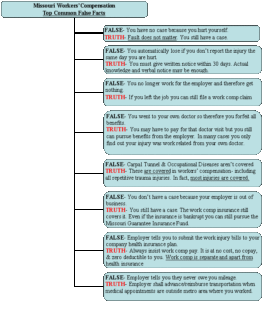 The Missouri Legislature submitted many changes to workers’ compensation in 2017. This culminated in Senate Bill 66 which was signed by the Governor on 7/5/2017 and became effective on 8/28/2017. Here is what you NEED to know:
The Missouri Legislature submitted many changes to workers’ compensation in 2017. This culminated in Senate Bill 66 which was signed by the Governor on 7/5/2017 and became effective on 8/28/2017. Here is what you NEED to know:
IMPORTANT NOTE– If you have a workers’ compensation injury that arose before 8/28/2017 then you should immediately consult with an attorney to determine if the new law applies retroactively to your claim. This depends on whether it is substantive versus a procedural change. As with any new law, the answers are yet to be determined by the courts.
Section 287.020.12: Defines maximum medical improvement (MMI) as the “. . . point at which the injured employee’s medical condition has stabilized and can no longer reasonably improve with additional medical care, as determined within a reasonable degree of medical certainty.”
Comment– This is important in determining Temporary Total Disability (TTD) and Temporary Partial Disability (TPD) and the date at which Permanent Total Disability (PTD) payments begin. TTD/TPD is paid time off work while you are recovering and are unable to work or earning less on light duty. MMI had never been defined by statute till now despite everyone using this term.
Comment– Many believe this amendment was in response to the Greer v. Sysco Food Services, SC94724 (Mo. banc 2015) decision. However, the new amendment does not forgo the situation where a person is released at MMI twice or goes on to get more treatment. Arguably, if you are released twice and/or go on to get more treatment then it would appear your condition was not “stabilized.”
Section 287.037.2: This allows certain shareholders of Chapter S corporations to reject Missouri workers’ compensation coverage.
Section. 287.120.6(4): New Drug Penalty Test:
“Any positive test result for a nonprescribed controlled drug or the metabolites of such drug from an employee shall give rise to a rebuttable presumption, which may be rebutted by a preponderance of evidence, that the tested nonprescribed controlled drug was in the employee’s system at the time of the accident or injury and that the injury was sustained in conjunction with the use of the tested nonprescribed controlled drug if:
- (a) The initial testing was administered within 24 hours of the accident or injury;
- (b) Notice was given to the employee of the test results within 14 calendar days of the insurer or group self-insurer receiving actual notice of the confirmatory test results;
- (c) The employee was given an opportunity to perform a second test upon the original sample; and
- (d) The initial or any subsequent testing that forms the basis of the presumption was confirmed by mass spectrometry using generally accepted medical or forensic testing procedures.”
Comment– The Employer must first perform steps (a) – (d). In some situations the drug penalty can be very severe and in some cases it can lead to a 50% or 100% forfeiture of all work comp benefits.
Section 287.149.1: TTD/TPD:
TTD or TPD benefits shall be paid throughout the rehabilitative process “until the employee reaches MMI, unless such benefits are terminated by the employee’s return to work or are terminated as otherwise specified in this chapter.”
Section 287.170.5: New penalty for voluntarily leaving your job: (One of the most significant changes in our opinion)
“If an employee voluntarily separates from employment with an employer at a time when the employer had work available for the employee that was in compliance with any medical restriction imposed upon the employee within a reasonable degree of medical certainty as a result of the injury that is the subject of a claim for benefits under this chapter, neither TTD nor TPD benefits available under this section or section 287.180 shall be payable.”
Comment– The statute does not address the situation when doctors have conflicting restrictions. Nor does it define what “voluntarily separates” means.
Section 287.200.1: Changes the statute to say PTD benefits start from date of MMI for the lifetime of the employee.
Section 287.203: Shortens the time in which Hardship Hearings must take place from 60 days to 30 days from the request.
Section 287.240(4)(a)– Adds “any stepchild claimable by the deceased on his or her federal income tax return at the time of injury . . . .” for dependents of a deceased worker for death benefits.
Section 287.243 Line of Duty Compensation Act– Many changes to the distribution of benefits to survivors of first responders who were killed in the line of duty.
Section 287.390.7: Settlements:
“In the case of compromise settlements offered after a claimant has reached MMI, upon receipt of a permanent disability rating from the employer’s physician, a claimant shall have a period of 12 months from such date to acquire a rating from a second physician of his or her own choosing.”
“Absent a finding of extenuating circumstances by an ALJ or the commission, if after 12 months a claimant has not acquired a rating from a second physician, any compromise settlement entered into under this section shall be based upon the initial rating.”
“A finding of extenuating circumstances by an ALJ or the commission shall require more than failure of the claimant to timely obtain a rating from a second physician”
“The provision of this subsection may be waived by the employer with or without stating a cause.”
Comment- Although this new amendment doesn’t say it, you always have the right to go to trial and not be bound by this rule. This rule hurts those workers without a lawyer who don’t know they can get their own doctor’s rating and to go to trial.
Section 287.780: Change in standard for proving an Employer discriminated against you for exercising your work comp rights:
“No employer or agent shall discharge or discriminate against any employee for exercising any of his or her rights under this chapter when the exercising of such rights is the motivating factor in the discharge or discrimination.”
“…motivating factor shall mean that the employee’s exercise of his or her rights under this chapter actually played a role in the discharge or discrimination and had a determinative influence on the discharge or discrimination.”
Comment- The prior standard under Templemire v. W & M Welding, Inc., 433 S.W.3d 371 (Mo. banc 2014) was “contributing factor”. Prior to that case, for decades it had been the “exclusive cause” standard.

